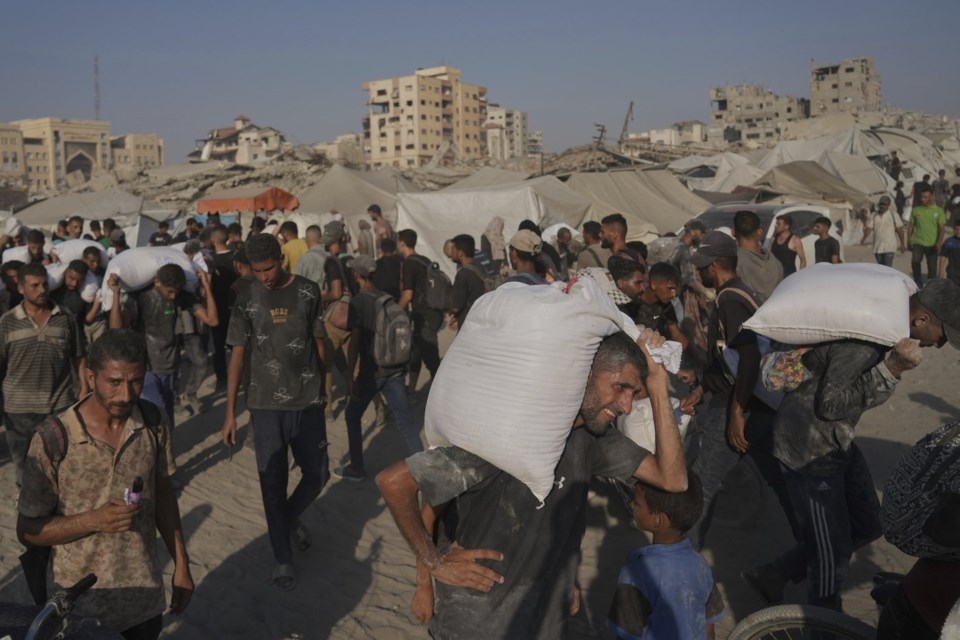ST. JOHN'S — A Toronto immigration lawyer says family members of Canadians are dying in Gaza as the federal immigration department drags its heels approving visas through a special program launched in 2024.
Debbie Rachlis said Canada must speed up the approval process for the temporary special measures visa it is offering to members of Palestinian Canadians' families who are trying to flee the violence in Gaza.
Rachlis represents dozens of applicants to the program and said she is involved with "at least five cases" in which people have died waiting for word on their visa. She lobbied for the special measures program as a member of the Gaza Family Reunification Project.
"We are all aware of many, many situations where people who were waiting for visas to come to Canada have died and have been killed," Rachlis said in a recent interview. That includes people who have died of starvation, or injuries from bombings, and people who have been killed while lining up to get rations, she said.
"They are all preventable and terrible deaths."
Canada opened the multi-step program offering temporary residents visas to members of Canadians' families trapped in Gaza on Jan. 9, 2024. It closed on March 26, after the program's cap of 5,000 visa applications had been accepted for processing.
Fewer than 1,200 visas had been granted as of June 21, said Jeffrey MacDonald, a spokesperson for the Department of Immigration, Refugees and Citizenship Canada. That's less than a quarter of the visas Canada said it would hand out.
Eight hundred and forty-one people had arrived in Canada from Gaza as of June 8, MacDonald said in an email.
The visa program requires applicants to submit biometric information — including fingerprints and photos — collected in-person at an IRCC office. There is no such office in Gaza. The Canadian Press has spoken to several Palestinian Canadians who paid thousands of dollars for their family members in Gaza to pay private agents for passage across the border in Cairo, where there is a Canadian immigration office to collect biometric data. The Rafah border between Gaza and Egypt has been closed since May 2024.
"The primary challenge continues to be the ability for people to exit Gaza," MacDonald said. "Movement out of Gaza remains extremely challenging and may not be possible at this time, as countries and other actors set their own entry and exit requirements."
"We continue working closely with local authorities — at every level — to facilitate the exit of people in Gaza and to advocate for their safety," he added.
Rachlis noted that other western countries have dropped the biometrics requirement. She wondered why Canada wouldn't do the same, especially as the situation for Palestinians in Gaza worsens.
Food experts have warned for months of the risk of famine in Gaza, where Israel has restricted aid because it says Hamas siphons off goods to help bolster its rule, without providing evidence for that claim. Images emerging from Gaza in recent days of emaciated children have fanned global criticism of Israel, including by close allies who have called for an end to the war and the humanitarian catastrophe it has spawned.
Last week, Prime Minister Mark Carney condemned the Israeli government for its "failure to prevent the rapidly deteriorating humanitarian disaster in Gaza" and criticized its handling of humanitarian aid in Gaza as a "violation of international law."
On Sunday, the Israeli military on began a daily 10-hour pause in fighting in three areas of Gaza, to “increase the scale of humanitarian aid” entering the territory.
Health officials in Gaza said at least 37 Palestinians were killed in separate strikes from late Saturday into Sunday, including 22 people seeking aid.
The situation in Cairo is also precarious for those waiting for visas, Rachlis said. She has many clients who managed to get to Cairo and complete the biometrics requirement. They've been waiting for a year or more for word on their visa application status, she said.
They have no medical care in Egypt and their children cannot go to school, she said. They are largely living off the fundraising efforts of charities and their families in Canada.
"We need to speed up processing for folks who are in Egypt," she said, adding that she believes much of the delay stems from the "intense scrutiny" applicants to the visa program are subject to. Applicants are asked to supply their social media accounts, details about scars and other marks on their bodies, information on everyone they are related to — including through marriage — and every passport they have ever had.
Last year, The Canadian Press obtained a letter sent to an applicant by a Canadian immigration officer which asks if they had "ever provided medical care to injured Hamas members." It is a violation of the Geneva Convention for medical workers to deny care to someone injured in a war zone.
Rachlis said families need quicker information about their applications so they can make arrangements and get to safety.
"Families need answers," she said. "They need answers about what happened with this program and why it seems to have been set up to fail."
This report by The Canadian Press was first published July 28, 2025.
— With files from The Associated Press
Sarah Smellie, The Canadian Press



